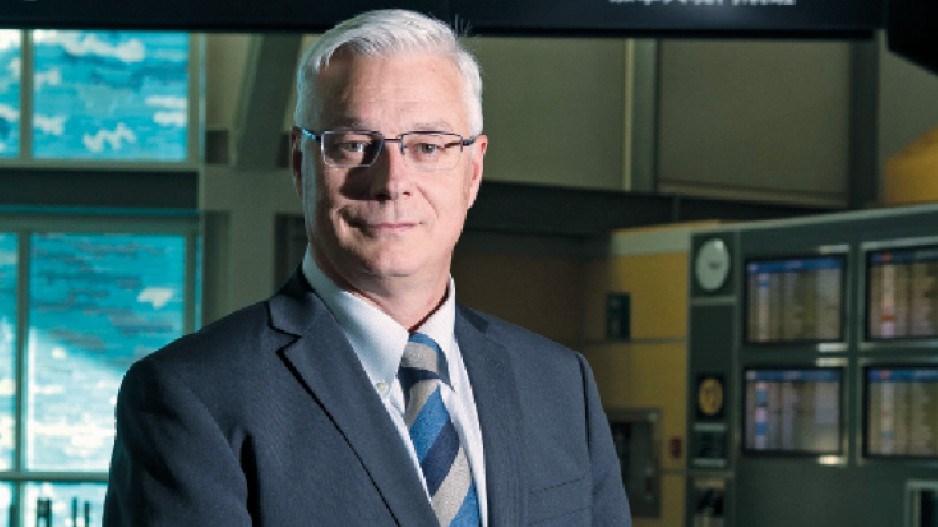He's been the Vancouver International Airport Authority's (VIAA) CEO for only three months, but Craig Richmond has already had some stressful days.
His therapy is to go to a Starbucks kiosk that overlooks the international arrivals area and watch people arriving, hugging and kissing loved ones.
"Ten minutes of that is like chicken soup for the soul," Richmond said. "It's kind of fun because we're in the business of connecting people."
The high-pressure life of an executive was almost not his calling, given that his original plan was to be a military man.
He spent five and a half years in West Germany as part of the Canadian Air Force, working with NATO troops and flying F-104s and F-18s to prepare for a potential Soviet strike.
When the first East German poked his head through the Berlin Wall after the East German government announced that its citizens could freely cross the border, Richmond was in Cold Lake, Alberta, watching his TV.
"I yelled, 'Don't do that, you'll get shot,'" Richmond said.
The man crossed the border unscathed, and Richmond realized he was seeing history. He bought some champagne and started to reflect on his life.
Should he stay in the military as planned?
The end of the Cold War seemed to be a clean bookend for what, in 1990, was a 10-year military career.
He completed a BA and an MBA at the University of Manitoba and found a temporary post as a consultant at VIAA.
Then came a job as manager of airside operations.
A few months after Larry Berg replaced David Emerson as VIAA's CEO, in 1998, Berg gave the then-37-year-old Richmond his first executive role: vice-president of operations.
"Craig was very capable under difficult circumstances," remembers Mike Harcourt, who was on the VIAA board between 1998 and 2004. "He had to manage what happened with all those flights diverted from the U.S., the planes on the aprons and all the thousands of passengers who had to be taken care of and billeted on September 11 [2001]."
Richmond remembers the 2002-03 Severe Acute Respiratory Syndrome (SARS) pandemic as being a more significant business challenge because Asian traffic through Vancouver International Airport (YVR) was put on life support.
"Terrorism happens, and people get over it right away. But the idea that there is a pandemic or epidemic where [passengers] are going is chilling."
Cathay Pacific transported two passengers on one Vancouver-Hong Kong flight. It then suspended flights out of Vancouver for a few months, as did Korean Airlines.
Slowly, traffic returned.
Soon after, Richmond and Berg managed to find $300 million to spend on the $2 billion Canada Line project, which eased access to the airport but ate into its parking revenue.
"I ride the Canada Line every day and see people with their bags," Richmond said. "They're not parking at the airport. So, we need to come up with innovative ways to [boost parking revenue.]"
Richmond did not get to see most of the Canada Line construction.
He left Vancouver in 2006, months after construction started, for what sounds like a dream job: CEO of the Nassau Airport Development Co. in the Bahamas.
VIAA's 50%-owned subsidiary Vantage Airport Group had snagged a contract to send a management team to what is now Lynden Pindling International Airport, near Nassau, and Richmond was tapped for the top job.
Four years later, he moved on to be CEO of three airports in England: Liverpool John Lennon, Robin Hood Doncaster Sheffield and Durham Tees Valley. Then, in January, he became CEO of the Larnaka International and Pafos International airports in Cyprus.
He said VIAA's half-ownership of Vantage allows the airport authority to offer management training opportunities and gives it access to experienced people around the world who can help with its business needs.
"When I was in Liverpool and had a security question, I knew there was a guy in Nassau who works for us and who was an expert."
Richmond has only started to settle into his corner office, overlooking YVR's apron, in the past few weeks.
He wanted to have a fresh start at YVR by looking anew at what VIAA's role and mandate was when it was established. So he read VIAA's original incorporation documents.
"The airport authority was brought into existence to foster economic activity and bring jobs to B.C.," he said. "That's really our job."
Critics such as former anti-HST activist Bill Tieleman have roasted the VIAA for charging local travellers an airport improvement fee that raises money to help speed connection times for those who pass through the airport but do not live in B.C.
"I don't understand that logic," Richmond said. "It shows a fundamental misunderstanding of how you get the traffic that boosts the economy."
Richmond wants YVR to be far more than the gateway to North America; he wants it to be the gateway to the Americas.
"There's 1.2 million people right now flying annually between China and South America. It's going to explode, and we're not taking advantage of it."
Richmond plans to meet Canadian Transportation Minister Lisa Raitt soon. One of the things on his agenda will be to push her to negotiate new liberalized air agreements with countries around the world.
When Canada negotiated an open skies agreement with Iceland earlier this year, it took only about a month before Icelandair announced plans to fly direct to Vancouver.
Richmond finds it incredible that airlines such as Thai Airways can't fly to Vancouver even if it wanted to because of the archaic air agreement that Canada has with Thailand.
"You don't know if there's pent-up demand unless you lift the lid off," he said.
"Why can't an airline fly direct from Vancouver to Thailand? Canadians go to Thailand in droves. I just find it odd that in this age of freeing up borders and non-protectionism this is one of those areas that still has a lot of it." •




